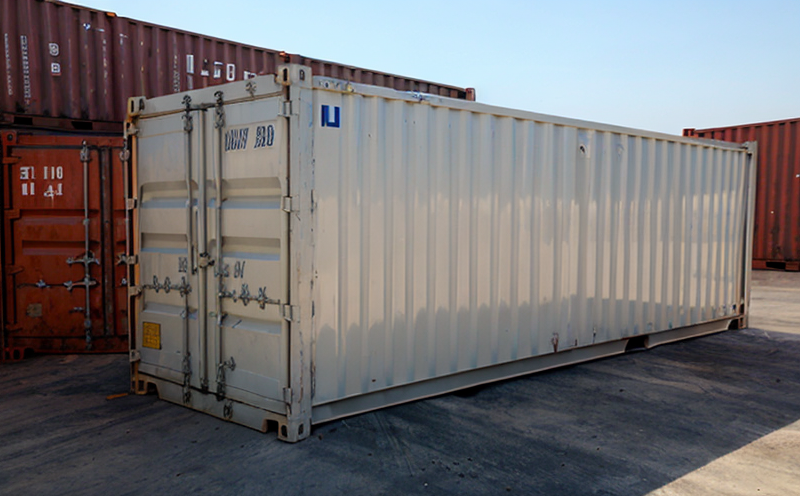Refrigerated container inspection
In the realm of transportation and logistics, refrigerated containers play a crucial role in maintaining perishable goods at optimal temperature conditions throughout transit. These specialized containers are designed to keep products such as pharmaceuticals, foodstuffs, and biologics safe from spoilage by preserving them within a controlled environment.
Given the criticality of these environments, rigorous inspection procedures are indispensable for ensuring that refrigerated containers meet the stringent requirements set forth by regulatory bodies. This service ensures that all aspects of the container’s integrity and functionality are thoroughly evaluated to prevent any potential issues that could compromise the quality and safety of the transported goods.
The importance of thorough inspections cannot be overstated, especially when dealing with sensitive cargo such as vaccines or fresh produce. A single breach in temperature control can lead to significant economic losses and health risks. Therefore, regular and comprehensive testing is essential for maintaining compliance with international standards and ensuring the reliability of transportation systems.
At Eurolab, our team of experts employs cutting-edge technology and methodologies to conduct these inspections meticulously. Our services encompass a wide array of checks including insulation integrity tests, temperature monitoring during transit, pressure testing, and leak detection among others. By leveraging our state-of-the-art facilities and experienced personnel, we guarantee that every refrigerated container undergoes robust evaluation.
Our approach ensures not only adherence to current regulatory requirements but also anticipates future trends in the industry. Through continuous research and development, Eurolab remains at the forefront of innovation in transportation logistics, offering clients peace of mind knowing that their critical cargo is safeguarded against all possible challenges encountered during shipment.
Why It Matters
The proper functioning of refrigerated containers is paramount for ensuring the integrity and safety of temperature-sensitive cargoes. The global transportation sector relies heavily on these specialized units to deliver perishable goods across vast distances without compromising their quality or shelf life.
A single instance where a container fails in its duty can result in substantial financial losses, reputational damage, and even public health crises. For instance, the failure of a vaccine shipment due to improper temperature maintenance could lead to shortages that affect millions of people worldwide. Similarly, spoiled foodstuffs not only waste valuable resources but also pose risks to consumers.
Regulatory bodies like the International Maritime Organization (IMO) and the United States Food and Drug Administration (FDA) impose strict guidelines on how these containers must operate. Compliance with these regulations is non-negotiable for shippers, carriers, and manufacturers alike. Non-compliance can lead to fines, legal action, and suspension of operations.
Moreover, maintaining stringent standards enhances the overall efficiency of supply chains by reducing delays caused by re-inspections or repairs. Efficient logistics are essential in today’s fast-paced business environment where time is money. By adhering to high-quality inspection practices, companies can streamline their processes and enhance customer satisfaction through reliable deliveries.
At Eurolab, we understand the significance of these inspections and commit ourselves fully towards providing comprehensive solutions that align with both present and future needs within this dynamic industry.
Applied Standards
| Standard | Description |
|---|---|
| ISO 14568:2014 | This international standard provides guidelines for the design, construction, and operation of refrigerated transport units used in maritime transport. |
| ASTM D7589-11 | An American Society for Testing Materials (ASTM) standard that covers the procedure for testing the thermal insulation performance of insulated containers. |
| EN 12023:2006 | This European standard specifies requirements and tests applicable to refrigerated transport units intended for road transport. |
| IEC 60794-5 | International Electrotechnical Commission (IEC) specifications addressing the performance of optical fibers used in temperature sensing within containers. |
| Standard | Description |
|---|---|
| USP 1079 | A United States Pharmacopeia (USP) monograph detailing the quality attributes and testing methods for refrigerated transport of pharmaceuticals. |
| GHTF/SG4:2011 | The Global Harmonization Task Force guideline for the safety assessment of temperature-controlled transport systems. |
| IMO Resolution MEPC.238(67) | An International Maritime Organization resolution providing recommendations on the safe operation and maintenance of refrigerated containers. |
| FDA 21 CFR Part 210 | A United States Code of Federal Regulations part governing good manufacturing practices for pharmaceutical products, including those requiring refrigeration during transport. |
Eurolab Advantages
At Eurolab, we pride ourselves on offering unparalleled expertise and advanced technology in the field of refrigerated container inspection. Our team comprises highly trained professionals who stay abreast of the latest developments within this ever-evolving sector.
Our facilities are equipped with sophisticated instrumentation capable of providing precise measurements and analyses necessary for thorough inspections. This allows us to identify even minor anomalies that might go unnoticed by less experienced operators. By leveraging our comprehensive knowledge base, we ensure that all containers meet or exceed the required standards set forth by regulatory authorities.
We offer a range of services tailored specifically to meet individual client needs. Whether it’s routine maintenance checks or detailed diagnostic evaluations, Eurolab is committed to delivering exceptional results consistently across all projects undertaken. Our collaborative approach fosters strong relationships built on mutual trust and respect.
In addition to our technical capabilities, we also emphasize the importance of sustainability in our operations. By adopting eco-friendly practices wherever possible, we contribute positively towards reducing the environmental impact associated with refrigerated transport solutions.





